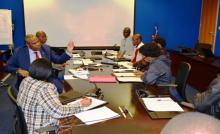Botswana trains newly recruited Malaria Elimination Surveillance Officers
Gaborone, 30 June 2016 -- “An excellent surveillance and response system is key to achieving and maintaining malaria elimination”. This was the assertion of Dr Magda Robalo, WHO AFRO CDS Director when officially opening a four-day innovative and intensive technical orientation for newly recruited district surveillance officers via video link. She commended the Government of Botswana for prioritizing surveillance and building requisite capacity. The orientation was held in the WHO Conference Room, for a total of 20 participants including district malaria focal points.
The surveillance officers were recruited through the Global Fund Grant, primarily to support malaria elimination in Botswana. The training will add value to existing malaria elimination efforts and related structures.
The objectives of the training were to orient the officers on the regional and global perspectives on the malaria burden; update them on national strategies/guidelines on malaria elimination; upraise them on WHO guidance on malaria elimination, particularly surveillance in elimination settings; and sensitize them on improving efficiency at district level.
Dr Robalo commended Botswana for her achievements in the past decade, making great strides towards implementation of key high-impact interventions. “This endeavor”, she said, “resulted in significant reduction of the malaria burden in Botswana since 2008. Malaria elimination is a realistic possibility in Botswana. According to a WHO analysis, six countries in the African Region have the potential to eliminate local transmission of malaria by 2020, and Botswana is one of them. Others are Algeria, Cape Verde, Comoros, South Africa, and Swaziland. Thus, in Botswana, there is a need to maintain the gains that have already been achieved and improve on them.”
The Director also intimated that pillar 3 of the newly launched Global Technical Strategy 2016-30 recommends that countries should upgrade malaria surveillance to a core intervention. She said this will improve the quality of data and consequent decisions. She thanked the Government of Botswana for strengthen district level surveillance by employing surveillance officers. Dr Robalo concluded by pledging WHO’s continued commitment and support to the government of Botswana on elimination efforts.
In his welcome remarks, the representative of the Ministry of Health, Mr Setshwano Mokgweetsinyana, thanked WHO at all levels for continuing to provide technical support in ensuring Botswana achieves malaria elimination. He expressed hope that the training will enable the officers to fill the current surveillance gaps in Case based surveillance, documentation as well as community involvement and inter-sectoral collaboration including with the private sector.
Mr Khoti Gausi, from IST/Harare, co-facilitated the training with Ms Kentse Moakofhi, the WCO Malaria technical officer. Key concepts and topics covered included Surveillance, Monitoring and evaluation, reporting, Early Warning, Detection, Notification and Verification of malaria epidemic, Prevention and Early response, Post–Epidemic assessment and preparedness plan of action.
In her closing remarks, the Programme Manager, Ms Tjantilili Mosweunyane, thanked WHO for the high quality knowledge and skills transfer. Post training evaluation by participants revealed that the participants are empowered to make malaria elimination a reality in Botswana.
Participants and the national programme recommended that similar training should be extended to other health cadres and programmes including IDSR and Child Health.
______________________________
01 Dr Ovberedjo (with raised hand) emphasizing team work in ensuring Botswana eliminates malaria
02 Workshop participants


